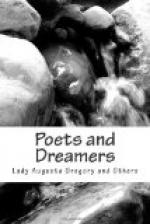’And when he rose up, he said he would go back to his friends. But the people of the house said: “You can go back if you like, but you will find none of your friends before you; for your sleep has lasted for seven hundred years.”
’So he went back; and there was nothing but grass and bushes in the village he came from. And he knelt down and made his repentance; and he was let up to heaven for the sake of the steward that was so good, and that made the Sunday begin at noon on Saturday.’
1902.
ON THE EDGE OF THE WORLD
Just where the road that runs by the bay turns northward to run by the Atlantic, a few white houses on either side turn it for a moment into a street. The grey road was not all grey yesterday, in spite of stones, and sea, and clouds, and a mist that blotted out the hills; for July had edged it with yellow rag-weed, the horses of the Sidhe, and with purple heather; and besides the tireless turf-laden donkeys, there were men in white and women in crimson flannel going towards the village. One woman sitting in a donkey-cart was chanting a song in Irish about a voyage across the sea; and when someone asked her if she was to try for a prize at the Feis, the Irish festival going on in the village, she only answered that she was ‘lonesome after the old times.’
At the Feis, in the white schoolhouse, some boys and girls from schools and convents at the ‘big town’ many miles away were singing; and now and then a little bare-footed boy from close by would go up on the platform and sing the Paistin Fionn, or Is truag gan Peata. People from the scattered houses and villages about had gathered to listen; some had come in turf-boats from Aran, Irish-speakers, proud to show that the language that has been called dead has never died; and glad at the new life that is coming into it. Men in loose flannel-jackets sang old songs, many sad ones, but not all; for one that was addressed to a mother, who had broken off her daughter’s marriage with the maker of the song, turned more to anger than to grief; and there was the love song, ‘Courteous Bridget,’ made perhaps a hundred years ago, by wandering Raftery.
A woman with madder-dyed petticoat sang the lament of an emigrant going across the great sea, telling how she got up at daybreak to look at the places she was going to leave, Ballinrobe and the rest; and how she envied the birds that were free of the air, and the beasts that were free of the mountain, and were not forced to go away. Another song that was sung was the Jacobite one, with the refrain that has been put into English—’Seaghan O’Dwyer a Gleanna, we’re worsted in the game!’




